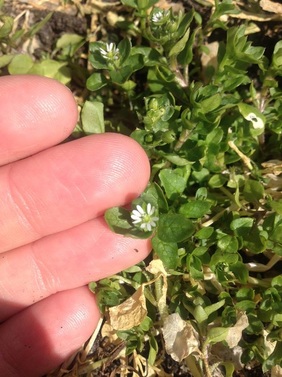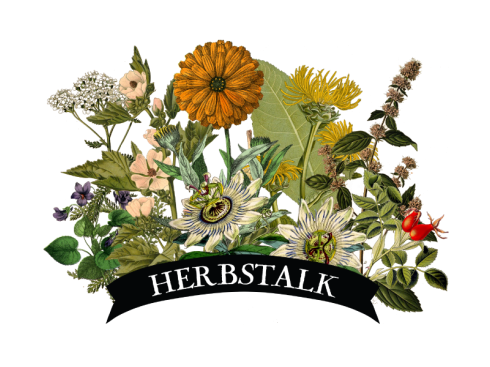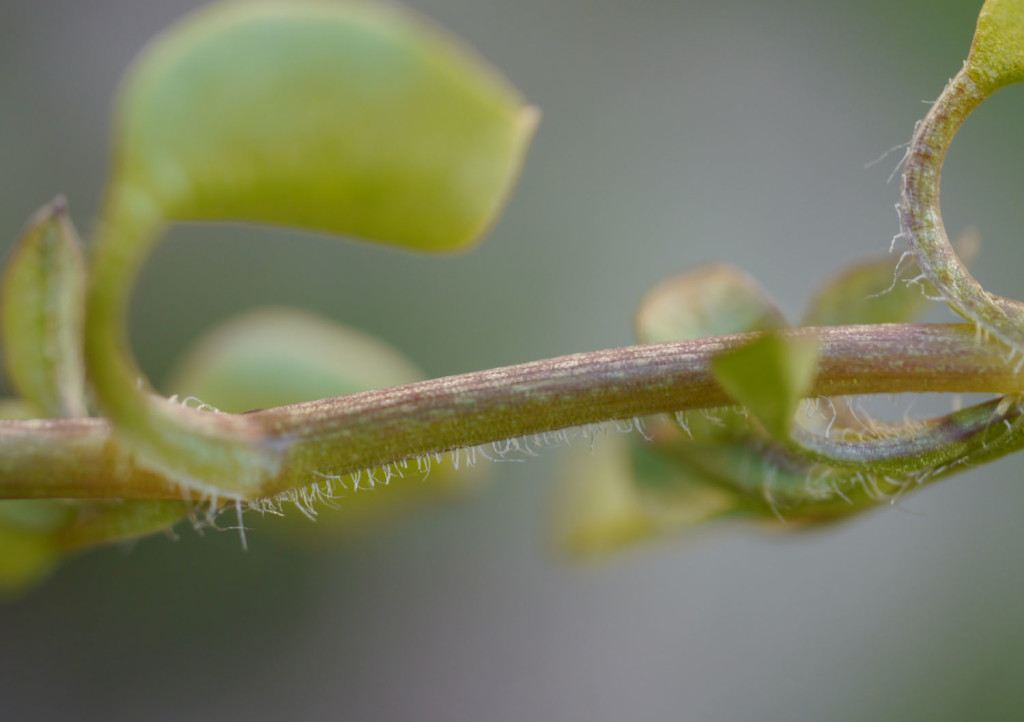 by Melanie Brown I adore plants that we have so fondly deemed “weeds”. Abundant, common, incredibly medicinal, and reaching out to pull us in whenever we walk by them. Stellaria media, or common chickweed, is one such weed that offers a generous amount of healing and nutritional uses. In Latin Stellaria means “little star”; media means “in the midst of.” So here we are in the presence of a plant that has naturalized itself all over the world. It helps soil retain nitrogen and is easily cultivated by spreading the seeds on disturbed earth. To identify look for many small, starry white flowers with 5 deeply divided petals; growing in low, dense, green mats with a single line of hairs on one side of the smooth stalks, then a second line of hair on the opposite side when it reaches the leaf node. When I first encountered chickweed on a hot summer day, with the sun shining high in the sky I was amazed at how cool and moist it felt, as if the patch had just been gently rained upon. Chickweed is sweet, moist, nutritive and cool; it can be harvested throughout its growing period while in flower or not. Regularly harvesting chickweed will inspire it to branch and produce thick regrowth. Using scissors simply snip off the top aerial portion. It contains mucilage, saponins, silica, minerals, vitamins A, B, C and fatty acids. It is also astringent, anti-rheumatic, and vulnerary. When eaten raw in your wild salads it has a bright, clean taste without any bitterness and a touch of saltiness. This demure, sweet plant has been shown to nourish the glandular and lymphatic systems. A tincture made with the fresh plant has the ability to dissolve cysts when taken regularly over a long period of time. Chickweed truly shines when we are encountering fevers, respiratory infections, allergies, bladder or kidney issues, liver stagnation, or digestive distress. Chickweed, used as a fresh poultice, draws out infection while also protecting and healing wounds. A decoction soaked compress or fresh plant poultice is refreshing and healing on dry, irritated eyes with or without an infection. A salve can also be made with fresh chickweed infused oil. Because it has such high water content I recommend infusing it using the “hot infusion method” such as in a crockpot or with a water circulator to prevent the growth of mold. A cream made with chickweed oil applied to eczema relieves itching and redness. Dried chickweed may also be drunk as a nourishing infusion weighing out one ounce to a quart of boiling water, covered and steeped 4 hours or overnight. Herbalists, such as Deb Soule from Avena Botanicals, love chickweed and see it as a most valuable plant to offer those in need of better nutrient absorption. “It is a safe and nourishing herb for a person of any age to take over several months when weak, chronically tired from overwork and stress, traumatized, anemic or recovering from a long-term illness or surgery.” Another respected herbalist, Jim Mcdonald, reports that chickweed, along with plantain (Plantago spp.), is a staple in his all-purpose salve for bug bites, stings, angry red wounds, scrapes, boils, and dry skin. Both Matthew Wood and Susun Weed remark on chickweed’s ability to reduce fat and aid weight loss. Weed points to the high saponin content as the mechanism, while Wood looks to its effects on metabolism and endocrine function. Wood elaborates in his book, The Earthwise Herbal: A Complete Guide to Old World Medicinal Plants, “Chickweed not only subdues heat and lubricates dry conditions, but also regulates water levels and drives off excess dampness and fats. These actions show that it stimulates both sides of the metabolism, building and breaking down, not only through the liver but also through the endocrine system. Thus, it is used to lose weight, not just short-term water weight, but long-term deposits of fats.” As you can tell Stellaria media lends itself to a wide range of healing benefits and food uses. This spring you may find me close to the ground, lying on my stomach in a bed of chickweed, eating, tincturing, juicing, infusing and simply admiring this shining star.  Melanie Brown is a native New Englander who always had an early connection to nature and the outdoors. Together with her four year old son she gathers the ingredients to make small batch plant based body care products which you can find at her herbal apothecary, FIR&ELM. She is a graduate of Boston School of Herbal Studies and currently attending The Gaia School of Healing and Earth Education in Vermont. Her passion is to share and spread the message of community herbalism that lies right outside in our own backyards. |
Archives
November 2023
Categories
All
|


 RSS Feed
RSS Feed